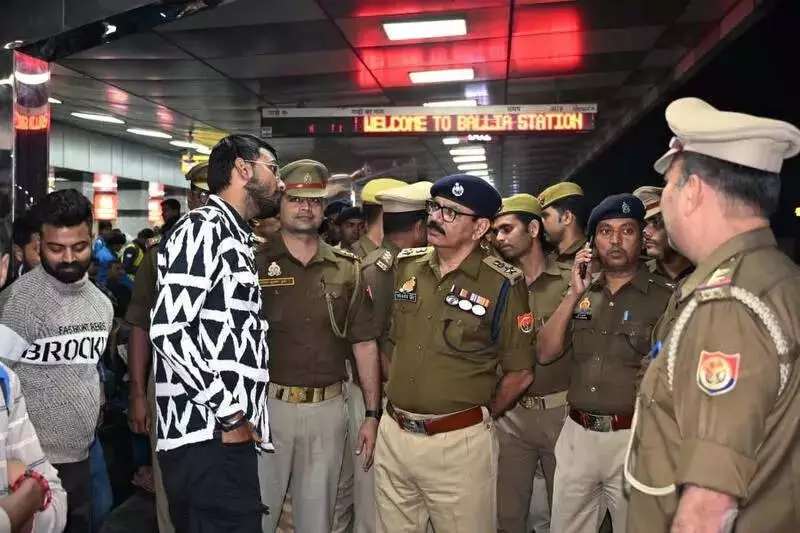
Massive Manhunt Launched for Terror Handlers After Delhi Incident
Indian investigation agencies have dramatically intensified their search for more than half a dozen terror handlers with connections to Azamgarh, following a recent car blast near Delhi's historic Red Fort. The security crackdown comes as authorities reconnect dots between current threats and unresolved cases from the past two decades.
The renewed focus targets individuals whose names initially emerged during investigations into major terrorist incidents, including the 2005 Shramjeevi Express blast in Jaunpur, the 2008 Batla House encounter, and the 2011 Delhi high court blast. Despite years of investigation, these suspects have managed to evade capture, raising concerns about persistent terror networks in the region.
Notorious Names Back in Spotlight
Investigators are currently piecing together evidence to track down seven key individuals from Azamgarh whose identities came to light after the Batla House encounter. The wanted men include Dr Shahnawaz, Bada Sajid, Salman, Khalid, Arif Junaid, Dr Asadullah Akhtar, and Mirza Shadab Beg. Security agencies have launched fresh operations to locate these suspects who have been underground for years.
Simultaneously, authorities are hunting for Wasif Billa, who allegedly worked as a terror trainer in Kerala and was declared an absconder by the National Investigation Agency (NIA). Another high-priority target is Shamim of Harkat-ul-Jihad-e-Islami (HuJI), who has been missing since the 2006 serial blasts at Varanasi's Sankat Mochan temple and Cantonment railway station.
Longstanding Cases and Unresolved Investigations
ADG, Varanasi Zone, Piyush Mordia confirmed that all police chiefs in Varanasi zone districts have been instructed to launch fresh efforts to track these terror handlers. The case of Shamim, a HuJI ultra from Chandauli district, highlights the challenges faced by investigators.
Police had announced a reward of Rs 20,000 for information leading to Shamim's capture in 2006, but neither was he located nor was the reward amount ever revised. Intelligence sources revealed that in 2007, agencies received inputs about Shamim's presence in Bangladesh. Of the Sankat Mochan blasts case, only mastermind Waliullah was apprehended and convicted.
Similarly, investigators failed to identify any perpetrators of the February 23, 2005 terror attack at Dasaswamedh Ghat. The Shramjeevi Express blast case, which claimed 14 lives and left 62 injured, saw some justice when two Bangladeshi HuJI operatives - Hilaluddin and Nafikul Biswas - were caught and convicted by a Jaunpur court in 2023.
Evolution of Terror Networks in the Region
The security landscape in Uttar Pradesh witnessed a significant shift in 2007 when Indian Mujahideen took over HuJI's operations in the region. The group executed destructive plans on November 23, 2007, with the Kutcheri blasts that killed nine people, including three lawyers, and injured 50 others.
IM's growing influence became particularly evident after the September 19, 2008 Batla House encounter in Delhi, where inspector Mohan Chand Sharma and two terrorists were killed in a gunfight. Two suspects, including Mohammad Saif of Azamgarh, were captured during the operation.
Saif's subsequent revelations exposed how extensively terror groups had established networks in Azamgarh. He confessed that he and Chhota Sajid, who was eliminated in the Batla House encounter, had planted a bomb during the 2007 Kutcheri blasts. His testimony brought to light seven other ultras from the district who remain at large.
The same IM group was responsible for the December 7, 2010 blast at Dashashwamedh Ghat, which killed a two-year-old girl and injured over 20 people, including five foreign tourists. During this period, Wasif Billa of Azamgarh gained notoriety for radicalizing and training youths in Kerala. Despite NIA announcing a cash reward for his capture, he has successfully remained elusive.
Authorities are also monitoring the network of local terror handler Aftab Ansari, who is currently lodged in Kolkata jail after being sentenced to death for the 2002 American Centre attack in Kolkata. The ongoing investigations suggest persistent attempts to reactivate dormant terror cells in the region, keeping security agencies on high alert.





